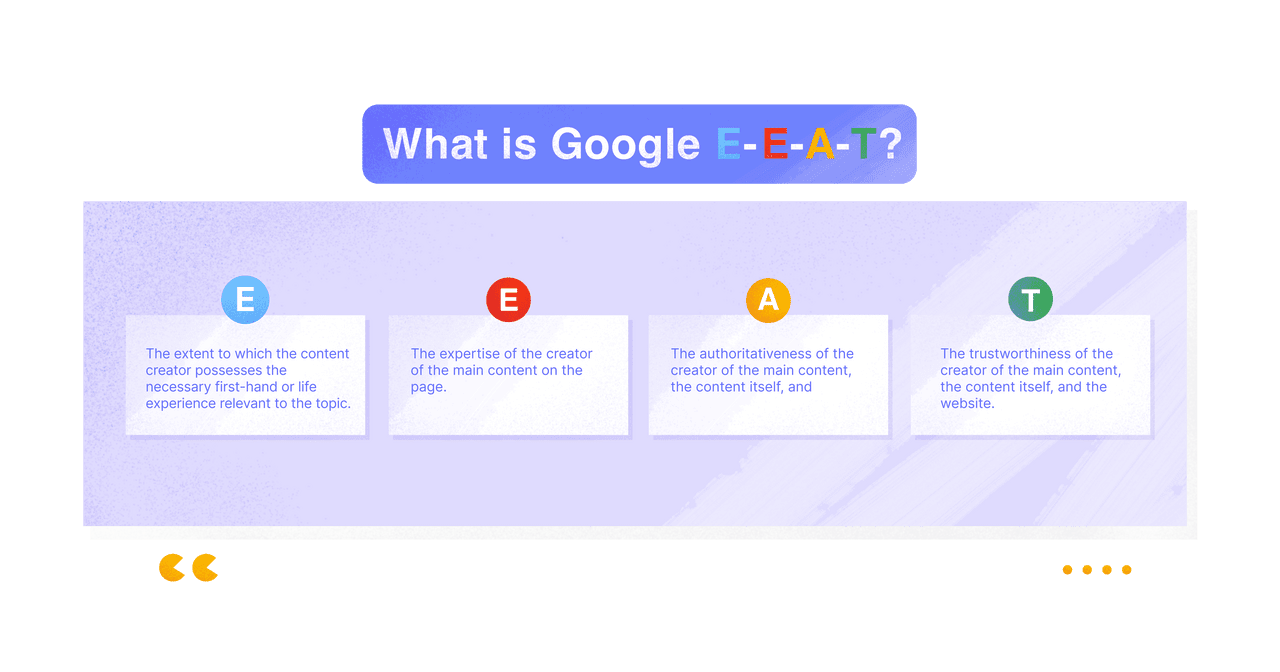Google recognizes and rewards sites that produce high-quality content, as they often provide the most relevant answers to user queries. The two primary concepts that Google uses to assess content’s overall quality and value are EEAT and YMYL. In this article, we’ll take a look at both concepts and learn how they can affect rankings.
What is EEAT?
EEAT (or Double-E-A-T) is an acronym for Experience, Expertise, Authoritativeness, and Trustworthiness. It is a combination of specific signals that Google considers when evaluating pages for their level of trust and quality. EEAT is foundational to Google’s Quality Rating Guidelines.

Google’s evaluation of a page’s trustworthiness and quality directly impacts its position on the SERP. For example, if users like a page as much as Google does, the page will compete with the highest ranking pages on the SERP for the same or similar search queries.
Let’s define each part of EEAT.
Experience
Google values creators who can bring real-life knowledge and expertise to create credible and useful content. Google prioritizes content creators with firsthand or relevant life experience because their wealth of personal experience can reliably contribute to trustworthy and effective pages.
Expertise
This indicator signals to Google that the content creator is or isn’t a competent professional with proven experience. Google favors content written by subject matter experts, which are people who have a deep understanding of and experience in a given topic. Google’s raters will quite literally scour the internet for background information on authors and their publications, even in cases where the publication covers a broad topic.
Authoritativeness
Google assesses the authority of the author, the main content of the page, and the website. Recognition from industry experts, reliable backlinks, and citations contribute to authoritativeness scores. Citations may include mentions in articles, reviews, or any other citation type.
Trustworthiness
Trust is a crucial element within the EEAT framework, that includes the reliability and dependability of the provided information. It includes the trustworthiness of the author, the page’s main content, and the website. Experience, expertise, and authoritativeness are basically the trust factors. It is important to note that trust itself is paramount, as pages lacking trustworthiness will have lower EEAT scores, regardless of their experience, expertise, or perceived authority.
Trustworthiness is determined by several trust factors. A great example of these factors is the credentials on the page: awards, testimonials, endorsements, etc.
EEAT incentivizes authors to demonstrate their experience, expertise, and authoritativeness, especially when writing about legal, financial, or medical topics. For example, medical advice should be written or produced by individuals or organizations with appropriate medical expertise or accreditation.
This leads us to Google’s other important concept—YMYL. Let’s find out what it is.
YMYL in a nutshell
Some topics can impact a user’s health, financial well-being, and safety. These topics include medical or financial websites or online stores. Google refers to them as Your Money or Your Life resources, or YMYL for short. Google will consider a site YMYL even if the site gives just one piece of advice on an important decision. Dedicated raters conduct thorough checks on YMYL sites to make sure they don’t contain inaccurate information and are not harmful to users.
Google broadly categorizes these resources as Clear YMYL, Potential YMYL, or Unlikely YMYL topics, depending on how likely they are to cause harm. Most topics are considered non-YMYL by default and do not require special attention to accuracy or trustworthiness.
Google’s guidelines define a topic as YMYL if it can potentially affect:
- Health or safety: mental, physical, and emotional health; any form of safety.
- Financial security: a person’s ability to provide for themselves and their families.
- Society: perception of groups of people, issues of public interest, trust in public institutions.
- Other: any topics where innaccurate info could harm people or worsen their well-being.
Harmful pages can still exist within non-harmful topics. These pages should be flagged as low quality and potentially harmful, even if the website has a generally positive reputation.
How EEAT and YMYL are connected
Now, let’s explore the connection between EEAT and YMYL. As mentioned earlier, greater authority and trust scores can contribute to higher rankings on Google. But don’t take our word for it. Hear it from the tech giant itself.
“We have very high Page Quality rating standards for YMYL pages because low-quality YMYL pages could potentially negatively impact a person’s happiness, health, financial stability, or safety”—Google.
If you own a YMYL resource, your EEAT score requires attention. As an example, consider a website for an accountancy firm that publishes tax planning and investment advice. Users that end up on this website should be confident that the provided advice won’t lead to wrong financial decisions or financial loss.
Generally, only individuals or organizations with appropriate financial expertise and accreditation should produce tax advice or materials on other YMYL topics. However, there are some exceptions when authors are sharing personal stories or experiences. Materials like “How I earned my first million” or “How we manage taxes in our company” are considered everyday expertise in YMYL topics and require less formal credentials.
A low EEAT score might prevent your site from ranking high. Websites that don’t pay attention to readers’ well-being when creating content risk not appearing prominently on Google for important keywords.
Even if your site isn’t considered YMYL, you should still work on your EEAT score, as a high score signifies a high-quality website. Always prioritize the well-being of your users and consider any potential effects your content may have on them. Provide YMYL information that is carefully fact-checked. If you need to address potentially harmful topics, be sure to warn people about the potential risks and negative consequences associated with those topics.
The evolution of EEAT and YMYL
The acronym used to be EAT (Expertise, Authoritativeness, Trustworthiness) and first appeared in 2014 when Google introduced its Search Quality Evaluator Guidelines. The concept was vague back then, and it wasn’t clear how Google would use qualitative factors when calculating quantitative rankings. And while users sought explanations, Google remained short on answers.
“The amount of expertise, authoritativeness, and trustworthiness is very important”—Google.
EEAT and YMYL survived several major Google updates:
- In August 2018, Google rolled out a massive core algorithm update. Although details about the update were scarce, it became evident that it was primarily about Google’s ability to determine the EAT score and identify the most trustworthy websites.
- In June 2019, another major update impacted the perception of EAT. Several websites with high authority scores experienced a significant drop in rankings shortly after the update, indicating that EAT is assessed at the URL level rather than for the entire domain. In other words, EAT should be considered one of the over 200 page quality parameters.
- In October 2020, Google made some important edits to the Search Quality Evaluator Guidelines. It clarified that EAT ratings do not directly influence the order of search results. The guidelines also emphasized the importance of understanding user intent and queries for accurate ratings. Additionally, some minor changes were made to the guidelines, including updates to explanations and examples.
- In October 2021, Google introduced more changes to the Search Quality Evaluator Guidelines. The YMYL category received expanded definitions and guidance on researching websites and the reputation of content creators. Furthermore, Google updated and clarified the “Lowest Page Quality” section.
- Another major update happened in July 2022 when Google aligned the document with the updated Search Quality Rater Guidelines. This update clarified the YMYL classification (Clear YMYL/May be YMYL/Not or unlikely YMYL), new examples were added, and explanations on determining YMYL status (whether it requires a high level of accuracy to prevent significant harm) were refreshed. The update also introduced explanations for the sections on the low and lowest page quality, clarifying that the level of EAT depends on the page’s purpose, so any type of website can be considered low quality or harmful.
- The most recent update to the Quality Rater Guidelines happened in December 2022. In this update, the EAT framework gained an additional component called Experience, leading to the acronym EEAT or “Double-E-A-T.” Google now considers whether content demonstrates firsthand experience, such as using a product, visiting a place, or sharing personal experiences. The updated guidelines emphasize the importance of EEAT and offer clearer guidance on the significance of original, helpful content. The guidelines also highlight that valuable information can take various formats and originate from diverse sources.
Even today, EEAT and YMYL remain a *** debate topic. It’s essential to note that while the Search Quality Evaluator Guidelines provide valuable information on EEAT, they are intended as working documents for evaluators and not as actual guidebooks.
Make sure to use this information with caution.
Is EEAT a ranking factor?
Despite its tremendous impact on page quality scores and rankings, most SEO experts agree that EEAT is not a full-fledged ranking factor, or at least not yet.
The main problem with EEAT is that it is a qualitative parameter rather than a quantitative one. For it to be considered a ranking factor, it would need to be calculated algorithmically. Additionally, there is currently no single EEAT score assigned to a website. Instead, it serves as a specific signal to other Google ranking algorithms, guiding their behavior toward a website.

Danny Sullivan
Public Liaison for Search at Google
While E-E-A-T itself isn’t a specific ranking factor, using a mix of factors that can identify content with good E-E-A-T is useful. Reading the guidelines may help you self-assess how your content is doing from an E-E-A-T perspective, improvements to consider, and help align it conceptually with the different signals that our automated systems use to rank content.

Ben Gomes
SVP of Education at Google
You can view the rater guidelines as where we want the search algorithm to go. They don’t tell you how the algorithm is ranking results, but they fundamentally show what the algorithm should do.
Nevertheless, Google has already started working towards turning EEAT into a numeric ranking factor. Several ideas for making it possible have already been proposed. Let’s start with the easiest and most obvious ones.
For one, Google pays people to assess websites. These people are called raters, and they assess the utility and quality of content according to expertise, authoritativeness, and trustworthiness. In theory, raters assign an overall score that can be included in ranking algorithms.

Danny Sullivan
Public Liaison for Search at Google
Our systems aren’t looking for EAT. Our raters are using that to see if our systems are working well to show good information. There are many different signals that, if we get it right, align with what a good human EAT assessment would be.
Another approach is calculating the number and context of mentions or links to the page or author. Links serve as strong indicators of content trustworthiness. In the case of YMYL topics, the reputation of a website or content creator can be assessed by the number of mentions from experts in the industry. Recommendations from expert sources, such as professional online communities, provide strong evidence of a highly positive reputation.
But more sophisticated solutions are also being explored. Google has a patent for technology that can calculate the credibility of an online content author. According to the description, the reputation score can include two or more sub-scores, where each sub-score relates to a different quality of the online content item. The reputation score can also consider the number of links the online content item has from other online sources and the length of time an author has been authenticated.
EEAT, as you can see, is a concept and not a ranking factor. But Google clearly sees EEAT and YMYL as important parts of Google’s future algorithms. It is possible that one day they may become a ranking factor.
How to optimize EEAT on YMYL pages
Producing high-quality content can be a lofty task all on its own, but ensuring your website is trustworthy for visitors adds an extra layer of complexity, especially for webmasters who own YMYL resources. Fortunately, there are several simple yet effective ways to optimize web pages for better EEAT.
- Create unique and high-quality content. Writing unique content for people, rather than solely for search engines, makes a big difference. To convince Google that you’re an expert, you have to understand your target audience’s interests and provide valuable information in an engaging way. Keep your content up-to-**** by periodically revising and adjusting existing texts.
- Maintain author visibility. Readers won’t trust your YMYL content if you don’t at least reveal the author’s basic credentials. Readers will want to know who created the article and with whom they can talk to if they have questions. According to Google guidelines, all site pages should contain information about who is responsible for the website and who created the content on the page (individual, company, business, foundation, etc.).
- For individual authors and content creators, create separate pages with biographical information, links to their social media accounts or personal websites, CVs, or professional certificates as proof of reputation. Utilizing Author Schema is a great way to facilitate the display of author information and expedite search engine indexing. Also, don’t forget to interlink pages using materials from the same author.
- Get mentions on authoritative sites. Implementing a smart link-building strategy can significantly improve your website’s reputation, both from a technical standpoint (e.g., leveraging the PageRank algorithm) and in the eyes of your readers. This means that a link from a highly authoritative website will pass some of its authority and brand recognition to another website. In the context of EEAT, obtaining backlinks to your author’s pages is also a good idea. Find websites that have a special bio section and arrange it so that you can get backlinks to your author’s page.
- Add trust factors throughout the site. Trust factors are a set of specific features or elements that help improve the trustworthiness of your site for both users and search engines. To get top-ranking positions, incorporate as many trust factors on your site as possible. For example, create and update an About Us page by highlighting your achievements, adding certificates and diplomas, or even displaying a portfolio along with reviews from real customers.
Final thoughts
Experience, Expertise, Authoritativeness, and Trustworthiness are important for determining page quality. While these factors aren’t directly quantifiable, they have a qualitative impact on a page’s ranking potential. EEAT parameters are especially important for YMYL resources, which have a direct impact on people’s health, well-being, and safety.
To increase the likelihood of your content ranking well, it is important to establish a clear purpose. Try to figure out how to create content that provides the most benefit to your users, then start working on authority and building your content’s trust score
Be sure to look out for more SE Ranking content related to this topic in the near future. We’re staying engaged and proactive about Google’s constantly changing content standards, and so should you, especially if you want to boost your rankings and keep your users happy.
